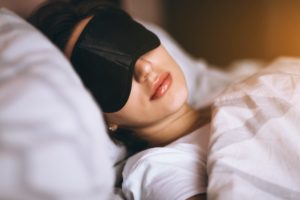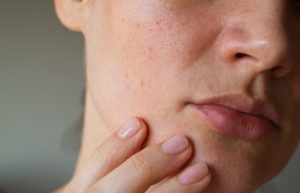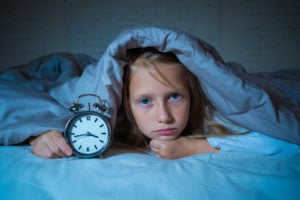When you buy through our links, we may earn a commission. Products or services may be offered by an affiliated entity. Learn more.
What Is a Normal Sleeping Heart Rate?
- While a normal resting heart rate is typically between 60 and 100 bpm, a normal heart rate during sleep drops to between 40 and 50 bpm.
- Monitoring your sleeping heart rate with wearable devices can help detect irregularities.
- Early detection of heart rate anomalies can lead to better overall health and sleep quality.
Your heart rate fluctuates throughout the day, based on activity levels and emotions. Stress and exercise can raise heart rate, while sleeping can lower it. A normal heart rate while sleeping is often between 40 to 50 beats per minute (bpm), though there is variability between individuals.
We discuss what is considered a normal sleeping heart rate for each age range, as well as share signs to look out for that may indicate an underlying condition.
Is Your Sleep a Problem
If you’re consistently struggling to sleep, there may be underlying sleep issues at play. Answer three questions to better understand your sleep.
Average Heart Rates
For most adults, a normal resting heart rate is considered to be between 60 to 100 bpm , though this range can vary and depends on multiple factors. Adult males tend to have lower heart rates.
A heart rate outside of this range may still be considered healthy in certain situations. For example, athletes and physically fit individuals may have resting heart rates as low as 30 bpm. Your doctor can help you assess whether your resting heart rate is healthy for you.
Resting heart rate decreases with age. For example, one large study found that the upper limit of the average resting heart rate is 110 bpm for adults 18 to 45 years old, 100 bpm for those between 45 and 60 years old, and 95 bpm for those older than 60. These are the average resting heart rates for healthy adults, as reported by the same study:
| Age | Typical Heart Rate When Awake |
|---|---|
| 18-20 years old | 68-96 bpm |
| 21-30 years old | 65-95 bpm |
| 31-40 years old | 63-94 bpm |
| 41-50 years old | 61-90 bpm |
| 51-60 years old | 60-87 bpm |
| 61-70 years old | 60-86 bpm |
| 71-80 years old | 63-85 bpm |

Typical Heart Rates During Exercise
During exercise, the Centers for Disease Control and Prevention (CDC) recommends aiming for a target heart rate between 64% and 76% of your maximum heart rate for moderate-intensity workouts, and 77% to 93% for high-intensity workouts.
You can estimate your maximum heart rate by subtracting your age from 220. For example, the maximum heart rate for a 20-year-old would be estimated to be 200 bpm. This means that the 20-year-old may want to aim for a heart rate between 128 and 152 bpm during a moderate-intensity workout, or between 154 and 186 bpm for a high-intensity workout.
However, there are additional factors to consider when calculating your target heart rate. It is important to consult with a medical professional to determine any potential risks prior to engaging in vigorous exercise.
Average Heart Rates While Sleeping
During sleep, it is normal for a person’s heart rate to slow down below the range for a typical resting heart rate. Between 40 to 50 bpm is considered an average sleeping heart rate for adults, though this can vary depending on multiple factors.
Typical Heart Rates for Children
Children typically have higher heart rates than adults. As a child gets older, their heart rate progressively slows down. Specific ranges for ideal resting heart rates in children may vary. The usual resting heart rates for children are based on the 10th through 90th percentiles in a meta review of nearly 60 studies .
| Age | Typical Heart Rate When Awake |
|---|---|
| Newborn | 107-148 bpm |
| 0-3 months | 123-164 bpm |
| 3-6 months | 120-159 bpm |
| 6-9 months | 114-152 bpm |
| 9-12 months | 109-145 bpm |
| 12-18 months | 103-140 bpm |
| 18-24 months | 98-135 bpm |
| 2-3 years | 92-128 bpm |
| 3-4 years | 86-123 bpm |
| 4-6 years | 81-117 bpm |
| 6-8 years | 74-111 bpm |
| 8-12 years | 67-103 bpm |
| 12-15 years | 62-96 bpm |
| 15-18 years | 58-92 bpm |
Research suggests that like adults, children’s heart rates are typically lower during sleep . For example, while children aged 6 to 8 years old may have resting heart rates of 74 to 111 bpm when awake, their sleeping heart rate might range from 67 to 89 bpm. Female children, younger children, and children with obesity tend to have faster sleeping heart rates.
How Does Heart Rate Change During Sleep?
In general, heart rate is slower during sleep than when a person is awake. However, heart rate also changes as a sleeper cycles through the different stages of sleep. In the first stages of light sleep, heart rate begins to slow. During deep sleep, the heart rate reaches its lowest levels. In rapid eye movement (REM) sleep, heart rate may speed up to a heart rate similar to when you are awake.
Most people experience a more relaxed heart rate during non-rapid eye movement (NREM) sleep, which helps protect against cardiovascular events. By contrast, REM sleep is often marked by periods of higher activity. While this is considered normal, researchers believe that the surge in activity during REM sleep could explain why already vulnerable people often experience heart attacks and other events in the early morning hours, which is typically spent more in REM sleep.
Sleep problems can have negative impacts on your heart and cardiovascular health, increasing your heart rate and contributing to higher blood pressure. Disorders such as sleep apnea, periodic limb movements, or shift work disorder that interfere with sleep have been linked to a higher chance of developing cardiovascular disease.
What Can Affect Sleeping Heart Rates?
Several factors can influence heart rate during sleep.
High Sleeping Heart Rate
With the possible exception of REM sleep, your heart rate should typically be lower during sleep than when you are awake. High heart rates are connected with taking longer to fall asleep and experiencing lower sleep quality, as well as an increased risk of cardiovascular disease.
- Stress and anxiety: Anxiety leads to an increased heart rate and higher blood pressure. Prolonged stress and anxiety can increase heart rate during sleep. Poor sleep, in turn, can negatively impact heart rate and blood pressure during the day.
- Sleep behaviors: Poor sleep hygiene can also contribute to a higher sleeping heart rate. One study found that shifting bedtime just 30 minutes later can raise resting heart rate during sleep, with effects that last into the following day. Nightmares and waking up in the middle of the night can also increase your sleeping heart rate.
- Pregnancy: As pregnancy progresses, heart rate may climb as it adapts to supply vital oxygen and nutrients to the growing fetus . Regular exercise may help lower resting heart rate and boost heart health during pregnancy.
- Other factors: Being sick with a fever can increase your heart rate. Certain medications may also increase heart rate. Caffeine and exercise can also trigger an increase in heart rate.
An increase in heart rate is not always a cause for emergency. Heart rate can temporarily rise for a number of normal reasons, from stress to exercise, and slow back down on its own. However, if it continues to stay elevated, contact a medical professional. In some cases, a high heart rate can signal an underlying health condition.
Low Sleeping Heart Rate
Lower heart rates can signal a healthier heart, as with athletes, but that is not always the case. Bradycardia, which is more common in older adults, describes a resting heart rate that is below 60 beats per minute.
A number of health conditions can contribute to lower heart rates, including heart disease, rheumatic fever, Lyme disease, and sleep apnea. Certain substances and medications may also cause a lower heart rate. Underlying health conditions such as anorexia, hypothyroidism, and sleep apnea can sometimes contribute to a lower heart rate.
When Is a Heart Rate Dangerous?
A heart rate can be dangerous if it is regularly above or below normal levels, but it depends on the situation. For example, a consistently low heart rate can be healthy in an athlete, but a sign of an underlying problem in an older adult or someone who lives a sedentary lifestyle. Brief spikes in heart rate during stress or physical activity are normal, but a resting heart rate that is consistently higher than average could indicate heart disease, or a thyroid problem. Knowing your typical heart rate can help you become aware when it falls outside of your normal pattern.
Symptoms like dizziness, lightheadedness, or fainting can be signs that a heart rate is too high or too low. A high heart rate may also cause symptoms like chest pain, shortness of breath, or heart palpitations. A low heart rate may cause fatigue, difficulty exercising, or brain fog.
How Can You Measure Your Sleeping Heart Rate?
To measure your sleeping heart rate at home, you can use a smart watch. Some companies are also starting to offer smart sensors that integrate into the bed. If your doctor suspects you may have a sleep disorder, they may order an in-lab or at-home sleep study with professional equipment that delivers a more accurate heart rate reading.
To calculate your resting heart rate during the day, lightly press the tips of your index and middle finger over the artery on your neck, your chest, or the inside of your wrist. Count your heartbeats for the next 30 seconds and multiply by two.
Some sleep tracking devices also function as heart rate monitors. For example, the Oura Ring measures your heart rate and heart rate variability in addition to metrics like sleep latency (or how long it takes you to fall asleep), the amount of time you spend in each sleep cycle stage during the night, and your overall sleep quality.
Tips for Managing Your Heart Rate
To change your sleeping heart rate and improve overall heart health, try these tips:
- Get better sleep: Follow a regular sleep schedule, and aim to get at least seven hours of sleep each day.
- Reduce stress and anxiety: Yoga, meditation, deep breathing exercises, or progressive muscle relaxation may help induce a state of relaxation with slower breathing and a lower heart rate.
- Exercise regularly: Physical fitness is associated with a lower resting heart rate.
- Avoid nicotine and caffeine: Nicotine and caffeine can cause heart palpitations.
- Eat a healthy diet: To help control heart rate and overall heart health , you may want to consider including more nuts, seeds, and fish in your diet and cutting down on cholesterol and saturated fats.
When to Talk to Your Doctor
If you have concerns about your heart rate, or it seems above or below what is considered normal, talk to your doctor. They can diagnose whether an underlying condition is contributing to your heart rate, and suggest treatment options, lifestyle changes, and changes to medications to bring it closer to normal levels.
Also let your doctor know if you regularly experience an irregular heart rate, or if your heart rate does not go back to normal after resting or deep breathing. If you experience other symptoms, such as chest pain, shortness of breath, heart palpitations, or feeling faint, seek medical attention immediately. Those who have been diagnosed with diabetes, high blood pressure, or high cholesterol should monitor their heart rate carefully.

Still have questions? Ask our community!
Join our Sleep Care Community — a trusted hub of sleep health professionals, product specialists, and people just like you. Whether you need expert sleep advice for your insomnia or you’re searching for the perfect mattress, we’ve got you covered. Get personalized guidance from the experts who know sleep best.
References
9 Sources
-
Avram, R., Tison, G. H., Aschbacher, K., Kuhar, P., Vittinghoff, E., Butzner, M., Runge, R., Wu, N., Pletcher, M. J., Marcus, G. M., & Olgin, J. (2019). Real-world heart rate norms in the Health eHeart study. NPJ Digital Medicine, 2, 58.
https://pubmed.ncbi.nlm.nih.gov/31304404/ -
Fleming, S., Thompson, M., Stevens, R., Heneghan, C., Plüddemann, A., Maconochie, I., Tarassenko, L., & Mant, D. (2011). Normal ranges of heart rate and respiratory rate in children from birth to 18 years of age: A systematic review of observational studies. Lancet (London, England), 377(9770), 1011–1018.
https://pubmed.ncbi.nlm.nih.gov/21411136/ -
Archbold, K. H., Johnson, N. L., Goodwin, J. L., Rosen, C. L., & Quan, S. F. (2010). Normative heart rate parameters during sleep for children aged 6 to 11 years. Journal of Clinical Sleep Medicine, 6(1), 47–50.
https://pubmed.ncbi.nlm.nih.gov/20191937/ -
Boudreau, P., Yeh, W. H., Dumont, G. A., & Boivin, D. B. (2013). Circadian variation of heart rate variability across sleep stages. Sleep, 36(12), 1919–1928.
https://pubmed.ncbi.nlm.nih.gov/24293767/ -
Azza, Y., Grueschow, M., Karlen, W., Seifritz, E., & Kleim, B. (2020). How stress affects sleep and mental health: Nocturnal heart rate increases during prolonged stress and interacts with childhood trauma exposure to predict anxiety. Sleep, 43(6), zsz310.
https://pubmed.ncbi.nlm.nih.gov/31863098/ -
Faust, L., Feldman, K., Mattingly, S. M., Hachen, D., & V Chawla, N. (2020). Deviations from normal bedtimes are associated with short-term increases in resting heart rate. NPJ Digital Medicine, 3, 39.
https://pubmed.ncbi.nlm.nih.gov/32219180/ -
Dietz, P., Watson, E. D., Sattler, M. C., Ruf, W., Titze, S., & van Poppel, M. (2016). The influence of physical activity during pregnancy on maternal, fetal or infant heart rate variability: A systematic review. BMC Pregnancy and Childbirth, 16(1), 326.
https://pubmed.ncbi.nlm.nih.gov/27784276/ -
May, L. E., Knowlton, J., Hanson, J., Suminski, R., Paynter, C., Fang, X., & Gustafson, K. M. (2016). Effects of exercise during pregnancy on maternal heart rate and heart rate variability. PM & R: The Journal of Injury, Function, and Rehabilitation, 8(7), 611–617.
https://pubmed.ncbi.nlm.nih.gov/26603201/ -
Sauder, K. A., Johnston, E. R., Skulas-Ray, A. C., Campbell, T. S., & West, S. G. (2012). Effect of meal content on heart rate variability and cardiovascular reactivity to mental stress. Psychophysiology, 49(4), 470–477.
https://pubmed.ncbi.nlm.nih.gov/22236402/

































































